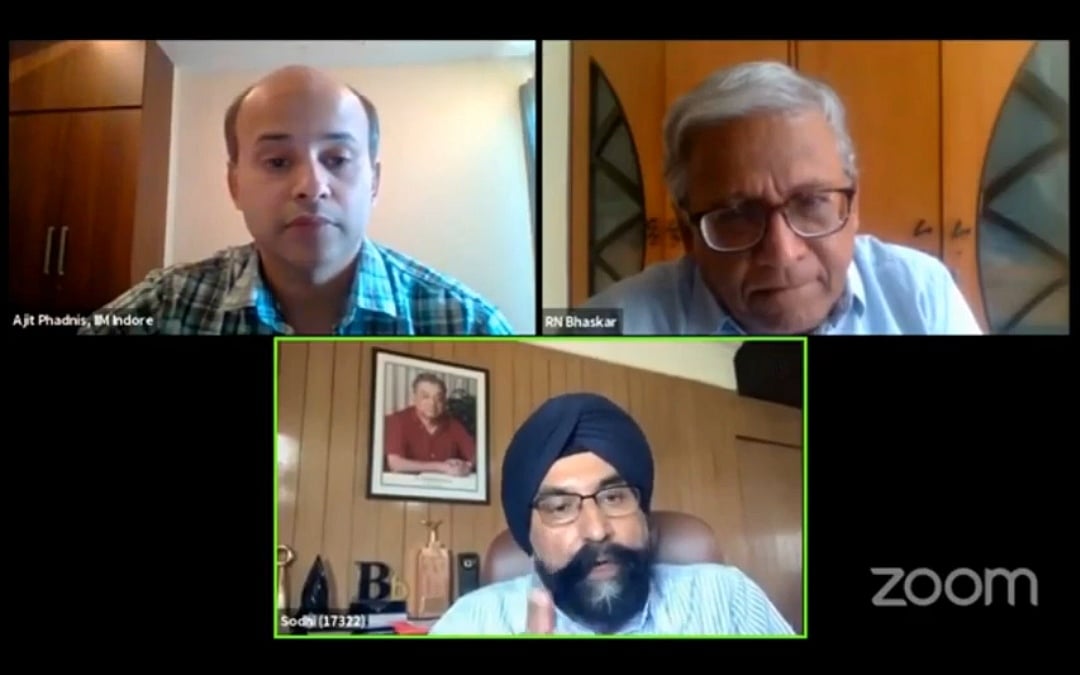Amul has been synonymous with milk in India for over seven decades. This popularity has not dropped but has increased with every passing day. Today, the turnover of GCMMF (Gujarat Cooperative Milk Marketing Federation, which owns and promotes the Amul branded range of milk and milk products) stands at Rs 51,000 crore for FY 2019-2020. RS Sodhi, Managing Director, GCMMF, during a webinar organised by The Free Press Journal (FPJ) in association with IIM Indore, stated that this growth is there to stay.
This webinar with Sodhi was part of an on-going series titled 'India after COVID' which was moderated by FPJ's RN Bhaskar and IIM Indore's Ajit Phadnis. This webinar is supported by media partner, Big FM and outreach partner, Moneylife.
The full recorded discussion can be found
Below are edited excerpts of the webinar RS Sodhi addressed:
Dairy Industry in India
Dairy Industry, one of the biggest industries in India, is an Rs 8-lakh-crore industry. The organised sector is Rs 2 lakh crore and it is contributing 4.4 per cent to the national GDP. While the unorganised sector is growing at the rate of 6 per cent, the organised sector is growing in double digits. Around 10 crore families depend on this industry for livelihood.
Lockdown phase
Either it is food or the number of COVID cases — that has been a topic of conversation in every home, during the lockdown. Fortunately, despite having a population of 1.35 billion people, India didn't have food shortage. This is mainly because India is a food secure nation. India is a self-sufficient country in almost every item of food except for edible oil.
While we are grateful to all our COVID warriors — doctors, nurses, paramedical staff, police personnel and others, we should also appreciate the 32-crore agricultural farmers, 10-crore farmers who are dairy producers and everyone else who is part of the food supply chain. It is due to them that we are at home. If food supplies were hit, there would have been riots.
Supply chain of dairy: Smooth as butter
The dairy supply chain is C to C (cow to consumer). There are no holidays in the dairy business. The supply chain of milk cannot stop unless you tell the cattle to stop producing milk. From day one of the lockdown, milk was given the status of an essential product. But we did face some challenges. There was some confusion during the first few days but later those issues got resolved.
Amul is procuring milk from 36 lakh farmers twice every day by using 5, 000 road milk tankers, from 18,500 milk collection centres, coming to around 282 dairy plants or chilling stations. After this, milk is converted into packaged milk, milk products or frozen milk products. At any given point of time, there are 50,000 supply chain partners on the road — 10,000 vans of milk, 10,000 trucks of finished goods, 5,000 delivery vans and other transport.
Old lessons in new era
In the late 80s and early 90s, Amul had faced such a challenge due to curfew that was imposed in Gujarat. So, we at Amul have had some experience of such situations. But this time, it was across the nation. However, this time the big advantage was technology.
Technology has enabled us to monitor milk supplies — sitting in our homes or offices – (we could monitor the) amount of milk supplied at 18,500 milk collection centres, which village is supplying how much milk and we are able to evaluate the reason behind the rise and drop in milk supply.
Moreover, a technology like GPS has enabled us to track the movement of 30,000 trucks that carry Amul products. It has helped us to monitor supplies at the retail level as well.
To encourage people in our supply chain to supply milk without any interruption, we offered them incentives. While the world was talking about job loss during the lockdown, we gave our supply chain partners, labourers and employees 15-20 per cent more in terms of wages and incentives. This was especially for employees working in plants and suppliers of milk. This decision was taken to motivate their efforts.
On April 25, we communicated to everyone in our system that their job is not just a job but is a national cause. Along with people in our supply chain, local administration also came forward to help us.
Demand-supply situation during lockdown
Soon after the lockdown was announced, there was panic buying for the first two-three days. There was a rise in demand during that time. On the fourth day, we saw a 30 per cent decline. But now our demand stands at the same level compared to pre-COVID times.
We lost 15 per cent sales among the hotels, restaurants and other segments but we saw a spike in demand in the home segment. People are consuming more at home. There has been an increase in consumption of value-added milk products like ghee, cheese, paneer, tetra pack milk etc – they saw a rise of 20-50 per cent. This scenario was not limited to India alone. Other countries witnessed a rise in demand for value-added products too. No one expected this rise. However, the ice cream business saw a drop of 95 per cent but some demand has picked up in this segment. Our ice cream distributors also shifted to the distribution of other dairy products. This is mainly because they had (the right) infrastructure. So overall, the business has become normal.
In addition, there has been a rise in procurement by 15 per cent. We are procuring more 35 lakh litres of milk. After some unorganised businesses stopped purchases of milk, that extra milk came to our system.
Increase in advertising spend
We started evaluating possibilities to build trust among our consumers and farmers, during this lockdown.
Due to Coronavirus, there was a rise in people watching news channels. So, we decided to spend a lot more on regional and local news channels. We doubled our spend on news channels and that too at a good bargain.
Second, when epics like Ramayan and Mahabharat was telecast we decided to air our advertisements through Doordarshan. We even got a suggestion from our consumers asking us to air the advertisement which were telecast in the 80s and 90s. So, we did that. With this move, we were able to increase our brand recall.
Multiplicity of brands coming up
India cannot be a country of a single food brand. But it will be extremely difficult for any food brand and dairy brand to establish itself in India and attain market leadership. India is a diverse country. To become a national brand in dairy you require huge infrastructure and milk procurement systems and that will take decades. It took us 74 years. If any foreign or Indian company wants to come into dairy, it needs to have very deep pockets, should be a very good brand and have robust infrastructure. It will take them three-four decades to reach the level where we are today.
Post-COVID
As far as consumption is concerned, it will continue to grow. But that will be driven by brand name and affordability as incomes of people will be impacted.
As consumption will increase and supply will reduce, there will be a rise in prices of perishables.
Across the world, food-rich countries are in a bad shape and they would use any means to dispose of their products in the largest and fastest-growing market — India.
We will be under tremendous pressure from rich countries to allow cheap imports of food into India. But that will be suicidal for our farmers.






